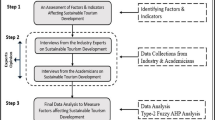Abstract
As a core component of the historical and cultural village, the quantitative evaluation method of the value of tourism resources has become the focus of the tourism planning study. At present, there is a lack of the characteristics of tourism resources in the process of tourism planning. A historical and cultural village tourism value evaluation method based on the theory is needed. In the scope of research, we expand the research object of the theory, and perfect the AVC theory and application research of the tourism resources of historical and cultural villages under the background of rural tourism planning. In depth of study, this paper analyzes the value characteristics of historical and cultural village tourism resources under AVC theory, and discusses the content system of tourism planning, which is a perfect study of the previous AVC theory. Finally, through the combination of theory and practice, we find the elements and influencing factors of tourism resources value, and make a quantitative evaluation of the value characteristics of tourism resources in historical and cultural villages. The study has reference value to quantify the evaluation of the value of historical and cultural village tourism resources and provide the basis for the historical and cultural village tourism planning method.




Similar content being viewed by others
References
Liu, B.: Trilism of tourism planning-the characterizing, positioning, forming and orienting of chinese modern tourism planning. Tour. Trib. 16(05), 55–58 (2001)
Wang, Y.: Synthetically evaluation study on three key factors of landscape and tourism planning. J. Tongji Univ. (Nat. Sci.) 30, 58–62 (2009)
Li, H.: Comparison of tourism planning in wetland parks based on AVC evaluation. J. Shanghai Marit. Univ. 35(12), 24–28 (2007)
Ma, W.: Xining Dongguan street evaluation and analysis based on AVC evaluation-to establish a special tourism block as the theme of the Muslim culture. Glob. City Geogr. 08, 253–254 (2015)
Liu, P.: Study on the AHP model of rurality inheritance in the Ancient village of tourism development: a case study of Chuandixia Village, Mentougou District, Beijing. Sci. Geograph. Sin. 32(11), 1304–1310 (2012)
Wang, Q.: AVC theory based rural landscape evaluation: taking Sandra village as an example. J. Northwest For. Univ. 31(03), 298–303 (2016)
Yu, X.: Study on Rural Ecotourism Landscape. Shanxi University (2009)
Yang, W.: Rural Folklore Tourism Resource Quality Evaluation Based on GIS. Capital Normal University (2009)
Yu, S.: Reproduction and inheritance: comprehensive evaluation of rural landscape based on AVC theory based on non-material cultural landscape—taking dragon town cultural tourism area as an example. Ecol. Econ. 10, 133–140 (2011)
Xie, Z.: Comprehensive evaluation of rural landscape based on AVC theory. Jiangsu Agric. Sci. 39(02), 266–268 (2011)
Shuang, W.: Suitability evaluation and zoning management of rural residential land based on AVC theory. Soils 46(1), 126–133 (2014)
Deng, Y.: Cultural characteristics of Ancient villages and towns in Hunan province f and its conservation value from the perspective of landscape gene. Econ. Geog. 31(09), 1552–1557 (2011)
Peng, L.: A social exchange spatial approach to the mechanism of personal transformation in Xidi village. Hum. Geograph. 05, 29–33 (2011)
He, Z.: Impact of tourism development on China’s historic villages and towns. City Plan. Rev. 35(02), 68–73 (2011)
Li, L.: Tourism sustainable development of village based on multi-attributes: a case study of national historic cultural village. Hum. Geograph. 04, 155–160 (2013)
Li, J.: The Research for the Redesign of the Rural Tourism Village. Wuhan University of Technology (2012)
Ba, Q.: The Protection and Panning of Ancient Village under the Perspective of Tourism. Jingdezhen Ceramic Institute (2013)
Dong, X.C.: Study on The Protection and Utilization of Landscape Resources of Live Villages under the Tourism Back Ground. Huazhong Agricultural University (2014)
Yuan, N.: Evaluation of tourism resources based on AHP method in ancient villages-a case of world heritage site of Xidi and Hongcun. Resour. Dev. Mark. 28(2), 179–181 (2012)
Hou, X.: The Research on Tourism Resources Value Evaluation of Historical and Cultural Villages in China. Tianjin University of Commerce (2011)
Chen, Y.: Development and protection of tourism resources of Ancient villages in the East of Hunan Province. Trop. Geograph. 27(3), 279–282 (2007)
Lu, S.: The research system of residents perception in tourist destinations and its enlightenment to the development of Ancient villages. J. Anhui Norm. Univ. (Nat. Sci.) 32(02), 178–182 (2009)
Wang, Q.: Quantitative evaluation method and empirical study of comprehensive value of Ancient villages—a case study of flag Ancient village. Tour. Trib. 21(01), 19–24 (2006)
Jing, H.: Analysis of tourism value and development model of national town (Village). Resour. Dev. Mark 23(5), 471–473 (2006)
Ma, X.: Fuzzy AHP comprehensive evaluation method of rural circular economy development process. Sci. Tech. Inf. 5, 65–66 (2006)
Acknowledgements
The content of this paper is based on the National Science & Technology Pillar Program during the 12th 5-year Plan Period (2015BAL01B02), Social Development and Scientific Research Projects in Shaanxi Province (2015SF294), Fundamental Research Funds for the Central Universities (Humanities and Social Sciences) Projects (310841155032) and also on 2014 Subsidy Programs of Science and Technology Funds of Housing and Urban-Rural Development in Shaanxi Province-Soft Science (2014-R80).
Author information
Authors and Affiliations
Corresponding author
Rights and permissions
About this article
Cite this article
Hou, Q., Yang, S., Fang, Y. et al. Research on the application of AVC theory in data analysis of urban affairs and planning method. Cluster Comput 22 (Suppl 3), 5279–5292 (2019). https://doi.org/10.1007/s10586-017-1224-6
Received:
Revised:
Accepted:
Published:
Issue Date:
DOI: https://doi.org/10.1007/s10586-017-1224-6




